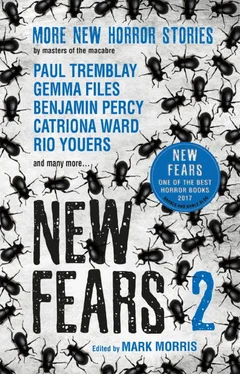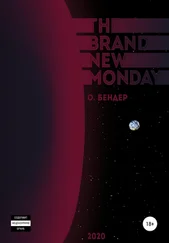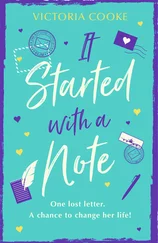There must have been fifty of them, maybe more, carved into the brickwork and all pointing in the same direction. A few of them were recent, their edges sharp and clear. Others appeared older, with moss dulling their clarity. Some were faded almost to nothing.
I stopped, gasping as I tried to catch my breath. Not my arrows , I thought, because they could not have been. I’d only been inside this tunnel once before and I hadn’t taken out my penknife.
I carved in a new arrow nonetheless, finding a bare spread of pitted brick and leaving my mark. I tried not to touch any of the others as I worked. Touching might link me to them, draw me in and make me part of the experience that had etched them there. All I wanted now was to find my way home.
* * *
It was like waking from a bad dream.
When I emerged from the tunnel at the same location where I’d entered––even though I knew I had not turned around down there––I could sense that everything had changed once again. Birds were singing a more familiar song. The light was softer and less threatening. Trees no longer whispered in the breeze. The skull close to the tunnel entrance was more exposed, and when I ran downhill and approached the canal, the old man who lived in the house there gave me a gruff nod.
I drove home faster than I should have, to find a jug of coffee on the warmer and Jayne in the shower. I stripped and got into the shower with her, and she reached for me as I started to cry, shivering uncontrollably even though she turned up the heat and hugged me to her, confused at my reaction and almost crying herself. I welcomed her touch and smell. I never wanted to let go.
By the time we went to one of our favourite riverside pubs for lunch, the things I had seen and experienced were starting to feel like a dream. The memories were woolly, although they did not fade. I drove so that Jayne could drink, but the real reason was that I did not want to muddy my thoughts and allow back in the fears and confusion.
Later, with Jayne snoring softly in bed beside me, moonlight passed through the curtains and cast uneasy patterns across the ceiling, shapes in which I perceived uncertain truths. But they were only shapes in my imagination, it was only moonlight, and I eased into a comfortable sleep listening to my wife’s breathing and feeling the weight of night as a comfort rather than a threat.
Upon waking, the previous day’s events had faded even more into that place where bad dreams inevitably dissolve.
* * *
Two days later I started climbing the hill to fill in the tunnel. Jayne knew that something had changed within me on that early morning run, and she did her best to draw it out and help me move on. But she also acknowledged my need to return on my own. The first time, I sat twenty feet from the tunnel and just stared, tempting the darkness to reveal to me what had happened. Something in there , I thought, and I imagined old discarded canisters of degraded gas, natural fumes from an unknown cavern system, tainted water dripping from the tunnel ceiling and entering my mouth. Something had taken me and edged me towards a terrifying madness, holding me over the edge of a deep and awful ravine. Only my determination had prevented me from falling.
That first day I kicked the sheep’s skull into the tunnel and piled a few rocks into the entrance, sweating and panting with the effort. When a family climbing up for a walk on the mountain gave me a strange look, I paused in my efforts and smiled at them. I offered no explanation. There was none that made any sense.
From then on I returned in the early mornings, telling Jayne I was going for a run up and around my familiar route. I halted every time at the tunnel, and after five days I’d piled in enough scattered rocks and fallen bricks to clog the entrance. On day six I used a heavy block to loosen more bricks, encouraging heavy falls of damp dirt from the banking above the tunnel, pushing it into hollows to bind and seal, testing the new barrier by standing and jumping on it.
Still it was not enough. At night the bad dreams lurked, and sometimes they came fully fledged, pursuing me like that mad, raving shape from my own ruined house as I thrashed and groaned myself awake and submitted to Jayne’s concerned hugs. She suggested I see someone. I agreed. I never kept the appointments, instead climbing the slope with bags of sand and cement in my rucksack. When there were enough I mixed the concrete, and probed it deep between rocks and bricks, filling hollows and smearing it across the filled-in tunnel entrance until I could see no holes at all leading inside.
Once dried, I covered the rough structure with mud and leaves and fallen branches. I planted several fast-growing shrubs around the area. By the time winter came, all evidence of the tunnel entrance was gone. Some people might have remembered it being there, but soon they would forget.
Sometimes I had nightmares about being buried alive, following a thousand arrows to an entrance that no longer existed. Often I believed that my waking life was the dream, and the tunnel was my dark, damp reality.
Jayne became tired of my nightmares. She found out that I had never gone to any appointments with the doctor or therapist. She left, accusing me of not doing anything to help myself.
In truth, I’d done everything I possibly could.
* * *
I’ve become one of those people. You know the type. People talk about me behind my back, sometimes in pity, more often with humour. Part of me wishes it was all back to the way it was before, but another part of me knows that I’m doing the right thing. This isn’t madness. I left madness down there in the tunnel, scratched on the wall and shut away with tons of stones and bricks, soil and cement. This is the exact opposite of madness. This is clarity. This is being prepared.
People have started to die. I’d been expecting it, and I’ve always been certain of who would go first––the closest person to me, though that closeness has changed. At least Jayne welcomed me to her bedside as she was ailing, and when I told her I loved her she smiled and said she loved me too. That means an awful lot and such knowledge will, I hope, give me courage in the times to come.
Times of plague and death, confusion and chaos. Times of silence. Times of decay.
I still go running every day, sometimes covering upwards of twenty miles. I pass by the hidden tunnel mouth occasionally, but I have no worries about anyone emerging from there. It’s solidly plugged. Besides, there are countless other places. Manholes and culverts, drains and caverns, riverbank hollows and old, forgotten tunnels under churches and castles, car parks and hotels.
I’m collecting as many weapons as I can find. I target houses where people have died, and it’s easy because the authorities have started painting these places with red circles. So far I have seven bows, three crossbows and two shotguns. Hardly a stockpile, but it will only be one man, and it will only take one shot.
I brought something back with me through that tunnel. A disease that is making this world its own, and which does not touch me. Thinking about why that is will send me mad, because I’ve heard no evidence of anyone else being immune. I’m cursed with a terrible purpose. I saw evidence of the contagion on the plants over there, the strange fungal-like growths, and perhaps I should have thought more of it when I found the empty town, the dilapidation, the mass graves. But I’m not in the business of regret.
Today, the traumatised authorities started digging a huge trench in the local park.
One day soon, when the world is dead and I’m one of the last left alive––perhaps the only one left––he will emerge from somewhere else and come to pay me a visit. He’ll know where to come because home is an important place. It’s somewhere you’re meant to feel safe. Once here, there’s no way I can let him return and take the infection back to where he came from. It’s a heavy responsibility, but one which I know I was destined to shoulder.
Читать дальше












